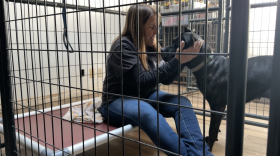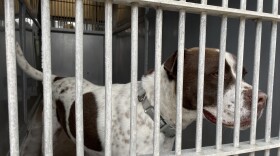-
San Diego Gas & Electric's launch this week of an Instagram account highlighting wildfire prevention efforts could be called "the G.O.A.T.," as the domesticated farm animal is its main attraction.
-
Goliath had been paired with several female tortoises before, in hopes of producing a hatchling, but the process wasn't successful until earlier this month.
-
Ed the Zebra was captured safely after being located in a pasture near a subdivision in the Christiana community in central Tennessee, the Rutherford County Sheriff's Office confirmed.
-
Dilly Dally, a loggerhead turtle who survived a run-in with a predator that ultimately cost her a flipper, has been rereleased into the wild.
-
Far-Flung Postcards is a weekly series in which NPR's international correspondents share snapshots of moments from their lives and work around the world.
-
Clownfish in Papua New Guinea are temporarily shrinking in response to heat stress caused by climate change, a new study found. Here's how that might help them deal with warmer water temps.
-
Valerie ran off while she was on a camping trip with her owners back in 2023 on a remote island in Australia. They had lost hope until locals spotted her more than a year later, surviving in the wild.
-
Far-Flung Postcards is a weekly series in which NPR's international correspondents share snapshots of moments from their lives and work around the world.
-
The sometimes uncomfortable sensations we feel in our teeth may be an evolutionary holdover from the scaly exteriors of ancient armored fish.
-
A new study details the evolutionary change of Anna's Hummingbirds, finding their beaks have grown longer and more tapered to get the most from common feeders.
RELATED STORIES
Sign up for our newsletters!
Keep up with all the latest news, arts and culture, and TV highlights from KPBS.
- Has Trump kept his campaign promises to American workers? Here's what some say.
- How Trump is decimating federal employee unions one step at a time
- Don't let a selfie be the end of you
- How 3 Hawaiian teen princes brought surfing to the mainland
- More students head back to class without one crucial thing: their phones























